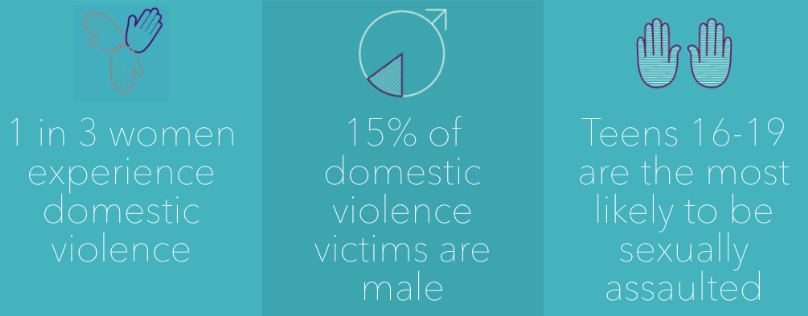
October '22 - Brainspotting for Domestic Violence
October is Domestic Violence Awareness Month
No matter the type of therapy you provide your clients, giving them resources to manage their situations is important. Tools such as checklists can help a client identify how they are feeling or how severe their situation is. To predict if they are in an environment that will turn abusive, the nonprofit WEAVE, or Women Escaping a Violent Environment, has a list of 17 signs of a battering personality.
Below is a list of behaviors that are seen in people who abuse their partners. If the person has three or more of the following behaviors, there is potential for physical violence. The more signs, the greater the risk. Sometimes, the person might only have a few of these behaviors, but they will be exaggerated or become more severe as time goes on.
17 Signs of a Battering Personality
1. Jealousy - the abuser might say this is a sign of love, but it is a sign of possessiveness and lack of trust. It involves questioning who you talk to and who and how much time you spend with family and friends, accusing you of flirting, calling or dropping by unexpectedly, checking your phone, car mileage, or GPS, or even refusing to let you work.
2. Controlling Behavior - the abuser will play this off as concern, but will be angry when you are late, question you about your actions, not let you make decisions, withhold money, or make you ask permission to do things.
3. Quick Involvement - many victims of DV knew their partners for less than six months before serious commitment. The abuser will put pressure on you to commit and may make you feel guilty if you don't.
4. Unrealistic Expectations - the abuser will expect you to meet all their needs, be perfect, etc.
5. Isolation - the abusive person will try to cut you off from all outside resources, accusing others of causing trouble. They may also keep you from having a phone, car, or going to school or work.
6. Blames Others for Problems - others are always out to get them and nothing is their fault. You are blamed for most everything that goes wrong.
7. Blames Others for Feelings - the abuser might say, "It's your fault I hit you," or "You make me mad."
8. Hypersensitivity - abusers are easily insulted. Hurt = mad. Setbacks are personal attacks, and they rant and rave about injustices of things that are everyday living, such as overtime, traffic, etc.
9. Cruelty to Animals or Children - an abuser takes out their anger on those in inferior positions. They may make children do things beyond their ability, get angry at a baby for wetting their diaper, or tease them until they cry. They are insensitive to animals' pain or suffering. They may not want them around.
10. Verbal Abuse - abusers say things that are hurtful, but they can also be degrading, vulgar, or dismissive of accomplishments.
11. Jekyll and Hyde Personality - abusers often have sudden changes in mood. Explosiveness and moodiness are typical.
12. Playful Use of Force in Sex - the abuser may be too forceful during sex, want to role-play fantasies where the woman is helpless, and may show that rape is exciting. They often aren't concerned if their partner wants sex and uses manipulation to get what they want.
13. Rigid Sex Roles - more typical in males the abusers expect their partner to serve them, sees them as inferior, and expects them to obey.
(The following are red flags that victims tend to fail to identify as being the beginning of physical abuse)
14. Past Battering - whether the abuser tells you they had a partner who 'made them do it' or you hear from their family or friends that they were abusive, there is abuse in their past relationships.
15. Threats of Violence - verbal threats made by the abuser that warn of physical force in order to control you.
16. Breaking or Throwing Objects - the abuser may try to break things as punishment or to scare you. They demonstrate extreme emotional immaturity.
17. Any Force During an Argument - things such as taking car keys, keeping you from leaving the room, physically restraining, or any type of pushing or shoving done by the abuser.
If your client finds themselves in an abusive relationship, has been the victim of domestic violence, or has even witnessed domestic violence, Brainspotting can help. For your most fragile clients, Expansion is a great option. Below is the basic Expansion set-up, but the class has over 12 set-ups to use for different situations.

